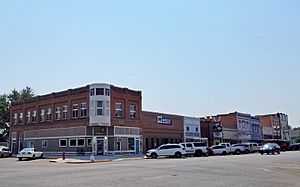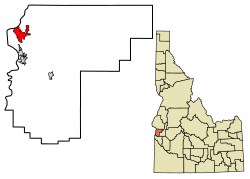Payette, Idaho facts for kids
Quick facts for kids
Payette, Idaho
|
|
|---|---|

Payette, Idaho, Main Street seen toward the N. A. Jacobsen building.
|
|

Location of Payette in Payette County, Idaho.
|
|
| Country | United States |
| State | Idaho |
| County | Payette |
| Area | |
| • Total | 4.02 sq mi (10.41 km2) |
| • Land | 3.98 sq mi (10.31 km2) |
| • Water | 0.04 sq mi (0.10 km2) |
| Elevation | 2,159 ft (658 m) |
| Population
(2010)
|
|
| • Total | 7,433 |
| • Density | 1,941.46/sq mi (749.54/km2) |
| Time zone | UTC-7 (Mountain (MST)) |
| • Summer (DST) | UTC-6 (MDT) |
| ZIP code |
83661
|
| Area code(s) | 208, 986 |
| FIPS code | 16-61300 |
| GNIS feature ID | 2411390 |
Payette is a city in Idaho, United States. It is the main city, or county seat, of Payette County. In 2010, about 7,433 people lived there. Payette is also part of a larger area that includes Ontario, Oregon.
Contents
History of Payette
The area where Payette now stands was first called "Boomerang." This was a camp built for the Oregon Short Line railroad between 1882 and 1884. It was located near where the Payette River meets another river.
Logs were floated down the river to sawmills at the camp. These logs were used to make wooden ties for the railroad tracks. After the railroad was finished, the settlement moved a bit upstream to its current spot.
In 1891, the town officially became a city and was named "Payette." This name honors François Payette. He was a French-Canadian fur trapper and one of the first European explorers in this area.
François Payette arrived in Idaho from Astoria, Oregon. He later managed a trading post called Fort Boise. This was for the British Hudson's Bay Company from 1835 to 1844. People liked Payette because he was a friendly and helpful person. He often assisted travelers who passed through the fort. After he retired in 1844, he went back to Montreal, Canada. What happened to him after that is a mystery.
In 1917, Payette County was created. It was separated from Canyon County. The city of Payette then became the county seat, meaning it was the main city for the county's government.
Geography of the City
Payette is located in the state of Idaho. The United States Census Bureau says the city covers about 3.86 square miles (10.0 square kilometers). Most of this area, about 3.85 square miles (9.97 square kilometers), is land. A very small part, about 0.01 square miles (0.03 square kilometers), is water.
Major Highways in Payette
Two important highways pass through Payette:
Population and People
This section tells us about the number of people living in Payette over the years.
| Historical population | |||
|---|---|---|---|
| Census | Pop. | %± | |
| 1900 | 614 | — | |
| 1910 | 1,948 | 217.3% | |
| 1920 | 2,433 | 24.9% | |
| 1930 | 2,618 | 7.6% | |
| 1940 | 3,322 | 26.9% | |
| 1950 | 4,032 | 21.4% | |
| 1960 | 4,451 | 10.4% | |
| 1970 | 4,521 | 1.6% | |
| 1980 | 5,448 | 20.5% | |
| 1990 | 5,592 | 2.6% | |
| 2000 | 7,054 | 26.1% | |
| 2010 | 7,433 | 5.4% | |
| 2019 (est.) | 7,727 | 4.0% | |
| U.S. Decennial Census | |||
2020 Census Information
The 2020 census counted 8,127 people living in Payette. This count also looked at different groups of people. The table below shows the racial makeup of Payette. Remember, Hispanic/Latino is considered an ethnic group and can include people of any race.
| Race | Number | Percentage |
|---|---|---|
| White (NH) | 5,750 | 70.75% |
| Black or African American (NH) | 21 | 0.26% |
| Native American or Alaska Native (NH) | 66 | 0.81% |
| Asian (NH) | 49 | 0.6% |
| Pacific Islander (NH) | 14 | 0.17% |
| Some Other Race (NH) | 35 | 0.43% |
| Mixed/Multi-Racial (NH) | 453 | 5.57% |
| Hispanic or Latino | 1,739 | 21.4% |
| Total | 8,127 |
In 2020, there were 3,081 households in the city. A household means all the people living in one home.
2010 Census Information
The 2010 census found that 7,433 people lived in Payette. There were 2,816 households and 1,910 families. Most of the people, about 86.6%, were White. About 19.3% of the population was Hispanic or Latino.
Many households, 36.7%, had children under 18 living with them. About 48.2% were married couples. Some households had a female head (13.6%) or a male head (6.0%) without a spouse. About 32.2% were non-family households.
The average age of people in Payette was 35 years old. About 28% of residents were under 18. About 15.6% were 65 years old or older. The population was almost evenly split between males (48.9%) and females (51.1%).
Climate and Weather
Payette has a semi-arid climate. This means it has cold, wet winters and hot, dry summers. A weather station in nearby Ontario, Oregon, has been recording weather since 1903.
| Climate data for Payette, Idaho, 1991–2020 normals, extremes 1892–present | |||||||||||||
|---|---|---|---|---|---|---|---|---|---|---|---|---|---|
| Month | Jan | Feb | Mar | Apr | May | Jun | Jul | Aug | Sep | Oct | Nov | Dec | Year |
| Record high °F (°C) | 66 (19) |
74 (23) |
83 (28) |
95 (35) |
100 (38) |
107 (42) |
111 (44) |
110 (43) |
102 (39) |
96 (36) |
78 (26) |
67 (19) |
111 (44) |
| Mean maximum °F (°C) | 53.1 (11.7) |
60.3 (15.7) |
71.0 (21.7) |
80.6 (27.0) |
89.9 (32.2) |
96.4 (35.8) |
102.6 (39.2) |
100.5 (38.1) |
93.5 (34.2) |
82.3 (27.9) |
65.9 (18.8) |
55.0 (12.8) |
103.0 (39.4) |
| Mean daily maximum °F (°C) | 39.1 (3.9) |
47.8 (8.8) |
58.1 (14.5) |
65.1 (18.4) |
73.9 (23.3) |
81.1 (27.3) |
91.8 (33.2) |
90.3 (32.4) |
80.3 (26.8) |
67.1 (19.5) |
51.5 (10.8) |
40.0 (4.4) |
65.5 (18.6) |
| Daily mean °F (°C) | 31.5 (−0.3) |
37.7 (3.2) |
46.1 (7.8) |
52.1 (11.2) |
60.8 (16.0) |
67.7 (19.8) |
76.4 (24.7) |
74.5 (23.6) |
65.2 (18.4) |
53.1 (11.7) |
40.9 (4.9) |
32.2 (0.1) |
53.2 (11.8) |
| Mean daily minimum °F (°C) | 24.0 (−4.4) |
27.6 (−2.4) |
34.0 (1.1) |
39.1 (3.9) |
47.7 (8.7) |
54.3 (12.4) |
61.1 (16.2) |
58.8 (14.9) |
50.1 (10.1) |
39.0 (3.9) |
30.3 (−0.9) |
24.4 (−4.2) |
40.9 (4.9) |
| Mean minimum °F (°C) | 7.6 (−13.6) |
14.4 (−9.8) |
21.6 (−5.8) |
26.8 (−2.9) |
33.5 (0.8) |
42.6 (5.9) |
51.1 (10.6) |
48.2 (9.0) |
38.2 (3.4) |
25.9 (−3.4) |
15.8 (−9.0) |
10.0 (−12.2) |
2.8 (−16.2) |
| Record low °F (°C) | −26 (−32) |
−23 (−31) |
−5 (−21) |
16 (−9) |
21 (−6) |
27 (−3) |
36 (2) |
32 (0) |
23 (−5) |
11 (−12) |
−2 (−19) |
−33 (−36) |
−33 (−36) |
| Average precipitation inches (mm) | 1.42 (36) |
1.07 (27) |
0.97 (25) |
0.82 (21) |
1.29 (33) |
0.82 (21) |
0.36 (9.1) |
0.24 (6.1) |
0.85 (22) |
0.63 (16) |
1.03 (26) |
1.75 (44) |
11.25 (286.2) |
| Average snowfall inches (cm) | 2.1 (5.3) |
1.5 (3.8) |
0.2 (0.51) |
0.0 (0.0) |
0.0 (0.0) |
0.0 (0.0) |
0.0 (0.0) |
0.0 (0.0) |
0.0 (0.0) |
0.0 (0.0) |
0.4 (1.0) |
8.0 (20) |
12.2 (30.61) |
| Average precipitation days (≥ 0.01 in) | 9.9 | 7.4 | 8.5 | 8.2 | 6.9 | 5.0 | 2.0 | 1.6 | 2.1 | 4.6 | 9.0 | 10.3 | 75.5 |
| Average snowy days (≥ 0.1 in) | 2.7 | 1.2 | 0.2 | 0.0 | 0.0 | 0.0 | 0.0 | 0.0 | 0.0 | 0.0 | 0.4 | 3.1 | 7.6 |
| Source 1: NOAA (snow/snow days 1981–2010) | |||||||||||||
| Source 2: National Weather Service | |||||||||||||
Education in Payette
The schools in Payette are part of the Payette Joint School District 371. The main high school for the district is Payette High School.
Famous People from Payette
Many interesting people have come from Payette, Idaho. Here are a few:
- Diane Anderson-Minshall, a journalist
- A. L. Freehafer, a politician
- William Norman Grigg, an author
- Michael Hoffman, a film director
- Donna M. Jones, who used to be Idaho's state controller
- Harmon Killebrew, a famous baseball player in the Baseball Hall of Fame
- James A. McClure, who was a U.S. Senator for Idaho from 1973 to 1991
- Rick Rydell, a radio host and author
- Herman Welker, who was also a U.S. Senator for Idaho from 1951 to 1957
See also
 In Spanish: Payette (Idaho) para niños
In Spanish: Payette (Idaho) para niños
 | DeHart Hubbard |
 | Wilma Rudolph |
 | Jesse Owens |
 | Jackie Joyner-Kersee |
 | Major Taylor |

